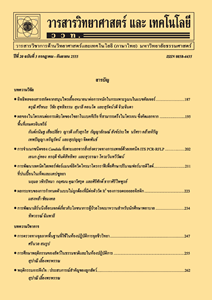การศึกษาประสิทธิภาพของเครือข่าย IPv6, IPv4 และ Dual Stacks ที่เปิดใช้งานการประกันคุณภาพการให้บริการ
Main Article Content
Abstract
บทคัดย่อ
ในอนาคตอันใกล้สิ่งสำคัญที่ผู้คนที่ใช้งานระบบเครือข่ายและเชื่อมต่อเข้ากับเครือข่ายอินเทอร์เน็ตจะต้องให้ความสำคัญก็คือการเปลี่ยนถ่ายจาก IPv4 ไปสู่ IPv6 และเรื่องการประกันคุณภาพการให้บริการในระบบเครือข่าย (QoS) ดังนั้นผู้วิจัยจึงทำการศึกษาเปรียบเทียบประสิทธิภาพการทำงานของเครือข่าย IPv6, IPv4 และ Dual Stacks ทั้งแบบที่เปิดใช้และไม่เปิดใช้งาน QoS โดยทดสอบหาค่าประสิทธิภาพในด้านของความเร็วในการรับส่ง (delay) อัตราการสูญหายของข้อมูล (packet loss) และอัตราส่งข้อมูล (throughput) โดยผลการทดลองที่ได้พบว่าเครือข่าย IPv6 มีเสถียรภาพสูงกว่าเครือข่าย IPv4 และ Dual Stacks เนื่องจากเกิด packet loss น้อยที่สุด ซึ่งน้อยกว่า IPv4 0.5 % และน้อยกว่า Dual Stack 1 % จึงสามารถสรุปได้ว่าในการปรับเปลี่ยนเครือข่ายจาก IPv4 ไปเป็น IPv6 นั้นจะทำให้เครือข่ายมีเสถียรภาพสูงขึ้น ในขณะที่ได้ throughput ของเครือข่ายเท่าเดิม และมี delay เพิ่มขึ้นเพียงเล็กน้อย นอกจากนี้การทำ QoS ที่เหมาะสมให้กับเครือข่ายจะสามารถลดอัตราการเกิด packet loss ได้อย่างมีประสิทธิภาพ และสามารถเพิ่มอัตราการส่งข้อมูล (throughput) อย่างเห็นได้ชัดเจน ในสถานการณ์ที่เครือข่ายมี background traffic ได้อย่างมีประสิทธิภาพอีกด้วย
คำสำคัญ : IPv6; IPv4; Dual Stacks; QoS
Abstract
Transitioning from IPv4 to IPv6 and enabling Quality of Services (QoS) on a network are becoming more important issues in the near future. In this paper we study the performance of the IPv6, IPv4 and Dual Stack networks with and without QoS-enabled by comparing data loss rate, transmission delay, and throughput. From our study, we found that the IPv6 network is more stable over both IPv4 and Dual Stack network because the packet loss is less than the IPv4 network 0.5 % and less than Dual STack network 1 %. For this reason, it can be concluded that transitioning from IPv4 to IPv6 will improve on network stability with the same throughput and the little increase of the transmission delay. In addition, enabling QoS on a network with background traffic will reduce the packet loss and increase the throughput significantly.
Keywords: IPv6; IPv4; Dual Stacks; QoS


